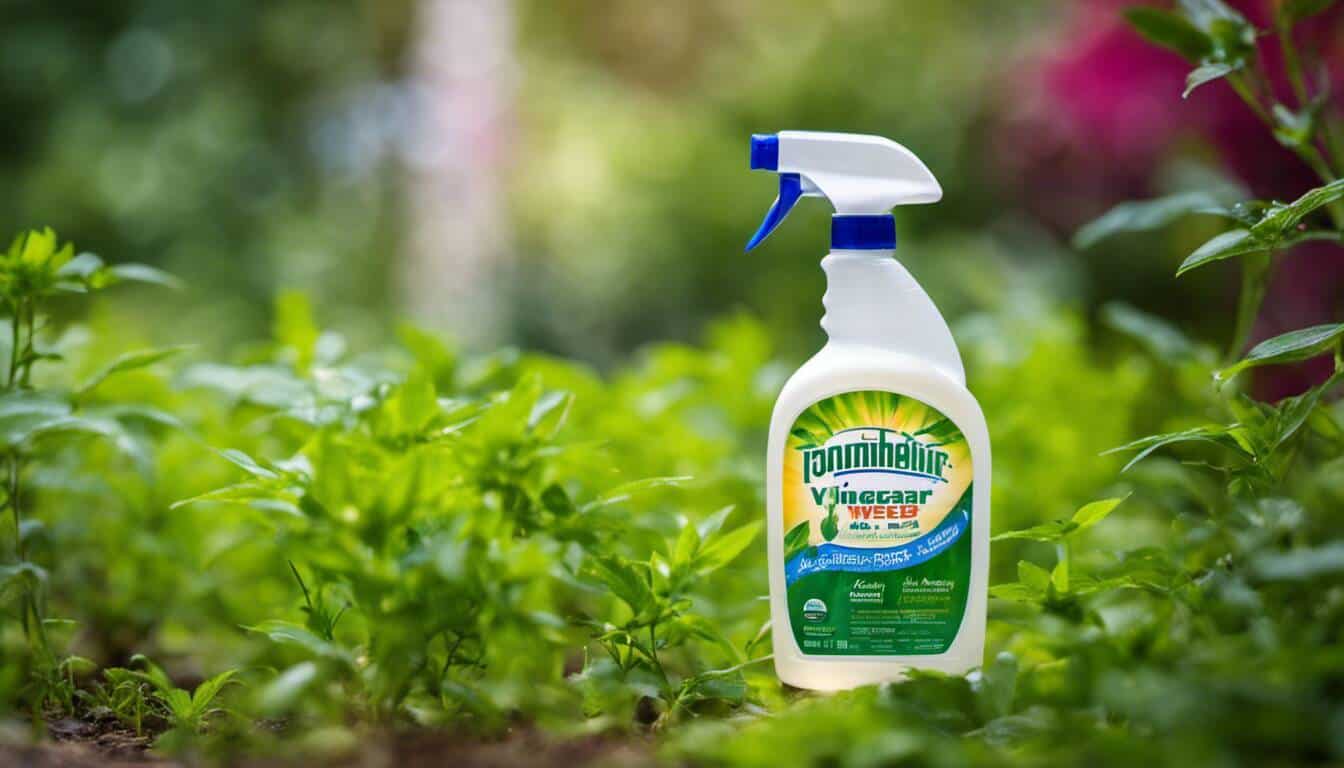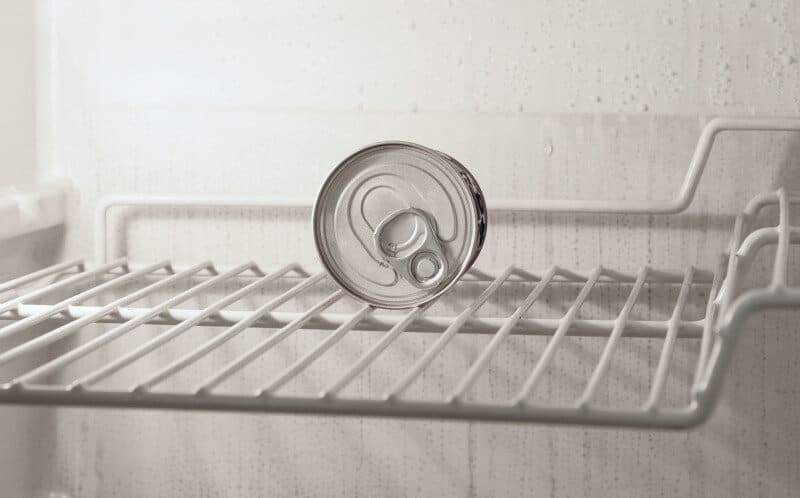Are you tired of losing your prized blooms to invasive weeds but also worried about the environmental impact of commercial weed killers? Welcome to a smart, sustainable solution that’s probably already in your kitchen – the homemade vinegar weed killer. This potent, eco-friendly alternative not only shows its might against obstinate weeds but also respects Mother Earth. For those interested in other eco-friendly cleaning solutions, check out our guide on baking soda and vinegar cleaning techniques. Read on as we unravel how this pantry staple takes center-stage in the battle against garden intruders, saving you money and assuaging your green conscience in the process.
To make vinegar weed killer, mix together 1 cup of salt, 1 tablespoon of dish soap, and 1 gallon of white vinegar. This organic solution can be an effective way to manage weeds in your garden; however, keep in mind that vinegar is non-selective and can kill any plant it comes into contact with. It’s best used in combination with other methods such as manual pulling, planting ground covers, and maintaining healthy plants. Wear protective gear and avoid spraying on windy days to prevent potential irritation or damage to surrounding plants.
Ingredients for Effective Weed Elimination
When it comes to eliminating weeds from your garden, using a homemade vinegar weed killer can be an organic and powerful approach. This natural solution is effective in managing unwanted plants, and its ingredients are easily available. To prepare this weed killer, you will need three key ingredients: vinegar, dish soap, and salt.
Vinegar serves as the primary active ingredient in this weed killer. Its acidity works by breaking down the cell walls of weeds, leading to the loss of moisture and eventually their demise. The acetic acid concentration in vinegar plays a crucial role in its weed-killing effectiveness. Higher concentrations (7-9% acetic acid) work well on young thistles, killing them within a day without adverse effects on the garden. On the other hand, lower concentrations (5% acetic acid) may require repeated applications or have limited efficacy against more resilient weeds.
Dish soap acts as a surfactant when mixed with vinegar. It helps the mixture adhere to the leaves of weeds and break down surface tension. This allows the vinegar to coat the leaves more effectively and ensure better absorption of its herbicidal properties.
Salt is another ingredient that enhances the weed-killing potential of the vinegar solution. Salt disrupts the osmotic balance within plant cells, leading to dehydration and eventual death. As a cautionary note, it’s important to mention that salt should be used sparingly as excessive amounts can accumulate in the soil and cause harm to beneficial plants.
To prepare the vinegar weed killer, simply mix together 1 cup of salt, 1 tablespoon of dish soap, and 1 gallon of vinegar. White vinegar is recommended for its colorless nature and affordability. It’s important to remember that this homemade solution should not be considered a sole solution for comprehensive weed management but rather one component of an integrated approach.
For example, combining methods such as manual pulling, organic herbicides, planting ground covers, adding mulch, and maintaining healthy plants can contribute to a more effective and holistic weed management strategy.
As with any gardening activity and the use of homemade solutions, it’s essential to exercise caution and follow best practices for safe application.
- Vinegar, with an acidity level of 5%, is capable of killing about 85% of plant growth it comes in contact with due to its ability to break down cell walls.
- Studies show that vinegar weed killers effectively control plant life within 13 hours of application when used in conjunction with salt and dish soap.
- According to a scientific study conducted in 2020, acetic acid, the primary component in vinegar, has been found effective in controlling up to 20 common weed species.
- Using a homemade vinegar weed killer can be an effective and organic approach to managing unwanted plants in your garden. Vinegar serves as the primary active ingredient, dish soap acts as a surfactant, and salt enhances the weed-killing potential. However, this solution should not be considered a sole solution for comprehensive weed management but rather one component of an integrated approach. Combining methods such as manual pulling, organic herbicides, planting ground covers, adding mulch, and maintaining healthy plants can contribute to a more effective and holistic weed management strategy. It is essential to exercise caution and follow best practices for safe application.
“Yes, homemade vinegar is an effective and eco-friendly method to tackle weed issues in your garden. It’s a non-toxic alternative that won’t leave harmful residues in your soil or affect the health of non-targeted plants or insects. Just be sure to apply it directly to the weeds and avoid contact with plants you wish to keep as vinegar is non-selective in its action.”
Lionel Valmont, Horticulture Consultant
Safe Application of Vinegar Weed Killer
When applying vinegar weed killer to your garden, it’s crucial to prioritize safety for both yourself and your plants. Here are some best practices to ensure safe application:
- Wear protective gear: Vinegar can cause skin and eye irritation, so wearing protective gloves, long pants, and sleeves is advisable when handling the vinegar weed killer solution.
- Choose appropriate weather conditions: It’s best to apply the solution on a calm day with little wind. This prevents the mixture from accidentally blowing onto yourself or nearby desirable plants, which could cause damage.
- Avoid sensitive areas: Take care not to spray the vinegar weed killer near water bodies or sensitive vegetation as it can affect them negatively. Be mindful of neighboring gardens or lawns that you don’t want to harm.
- Target specific areas: Rather than indiscriminately spraying the entire garden, focus on targeted applications directly on the leaves of weeds. Using an atomizer or sprayer designed for precision can help you avoid contact with desirable plants.
- Timing matters: For optimal results, spray the vinegar weed killer during midday when weeds are most thirsty and actively growing. This ensures better absorption of the solution by the weeds.
- Post-application care: After the weeds have wilted and died off, flush the area with water to remove any residual vinegar solution from the soil surface. Adding lime to the soil can help neutralize any acidity remaining from the vinegar.
By following these safe application practices, you can effectively manage weeds in your garden without compromising the health of your desired plants.
Best Practices for Protecting Beneficial Garden Plants
Maintaining a beautiful and thriving garden involves not only eliminating weeds but also protecting the beneficial plants that contribute to its overall beauty and health. When using vinegar weed killer or any other weed control method, it is crucial to follow best practices to ensure the safety and well-being of your garden plants.
First and foremost, it is essential to identify and target the specific weeds you want to eliminate. By accurately identifying the weeds, you can focus the application of the vinegar weed killer directly on them, minimizing any potential harm to nearby beneficial plants. For those who prefer a more hands-on approach, consider using a weed trimmer for precise weed control.
Furthermore, it is advisable to apply vinegar weed killer selectively rather than indiscriminately spraying it over your entire garden. Spot treat the weeds by spraying directly onto their foliage, taking care to avoid any contact with desirable plants. You can use a spray bottle or a small handheld sprayer for better control.
Let’s say you have a vegetable garden with stubborn weeds growing among your precious tomatoes and peppers. Rather than dousing the entire garden in vinegar, carefully spray the foliage of only the unwanted weeds, keeping the vinegar away from direct contact with your vegetable plants.
In addition to targeted application, it’s important to wear protective gear when handling and applying vinegar weed killer. This includes gloves, long pants, and sleeves to protect your skin from potential irritation. Since wind can carry spray droplets onto unintended areas, it is wise to avoid spraying on windy days to prevent contamination of nearby beneficial plants.
To further safeguard your garden from potential harm, consider combining different methods for effective weed management while maintaining healthy plants.
Efficacy of Vinegar Weed Killer
Vinegar weed killer has gained popularity as an organic approach to managing weeds effectively. Its active ingredient, acetic acid, works by breaking down cell walls and removing moisture from weeds, ultimately causing them to die off. However, it is important to understand the limitations and efficacy of vinegar in weed control.
Imagine vinegar as a warrior battling against weeds – it is powerful but has its weaknesses and requires strategic implementation.
While vinegar can be highly effective in killing many types of weeds, it is considered a nonselective herbicide, meaning it can harm any plant it comes into contact with. Therefore, it’s crucial to use caution when applying vinegar weed killer near desirable plants, as they could potentially suffer damage or die alongside the weeds. For those looking for alternative methods, consider exploring DIY pest control options that are both effective and safe for your garden, it is considered a nonselective herbicide, meaning it can harm any plant it comes into contact with. Therefore, it’s crucial to use caution when applying vinegar weed killer near desirable plants, as they could potentially suffer damage or die alongside the weeds.
For instance, if you have dandelions taking over your lawn, carefully spray vinegar on their leaves without coming into contact with the surrounding grass to avoid damaging the healthy turf.
It’s worth noting that the efficacy of vinegar weed killer varies depending on factors such as weed species and maturity. Young and tender weeds are more susceptible to the effects of vinegar compared to well-established, mature weeds with deep root systems. Thus, repeated applications might be necessary for stubborn or mature weeds to achieve desired results.
Some may argue that vinegar alone is not sufficient for complete weed management in a garden setting. While it can effectively control existing weeds, preventive measures such as planting ground covers, adding mulch, maintaining healthy plants, and regular manual weeding should also be incorporated for long-term weed control.
Now that we have discussed best practices for protecting beneficial garden plants and delved into the efficacy of vinegar weed killer, let’s proceed to explore how different weed control methods compare with each other.
Comparing Different Weed Control Methods
When it comes to dealing with weeds in your garden or lawn, you have several options at your disposal. Let’s explore and compare different weed control methods to help you make an informed decision that aligns with your preferences and values.
Manual Pulling: The traditional method of manually pulling weeds is labor-intensive but effective for smaller areas or when dealing with stubborn weeds. It’s important to remove the entire root system to prevent regrowth.
Organic Herbicides: Organic herbicides, derived from natural ingredients like citrus oil, clove oil, or vinegar, offer a more environmentally friendly option. They target the weeds while minimizing harm to other plants. Vinegar weed killer falls into this category.
Chemical Herbicides: Chemical herbicides such as glyphosate-based products (e.g., Roundup) are widely used due to their effectiveness. However, they can have adverse effects on the environment and human health if not used carefully.
Ground Covers: Planting ground covers like mulch or landscaping fabric can suppress weed growth by blocking sunlight and inhibiting their germination.
Mulching: Mulching around plants and garden beds helps retain moisture, regulate soil temperature, and prevent weed growth. Organic mulches such as wood chips or straw are popular choices.
Maintaining Healthy Plants: Keeping your garden in optimal condition through regular watering, proper fertilization, and good gardening practices can strengthen plants and minimize opportunities for weeds to take hold.
Now that we’ve explored different approaches to weed control, let’s dig deeper into the science behind the effectiveness of vinegar as a powerful organic weed killer.
Decoding the Science Behind Vinegar’s Effectiveness
Vinegar has been hailed as a versatile household product with various uses, including its application as an organic weed killer. But how exactly does vinegar work to combat those unwanted plants?
Vinegar, commonly known for its acidic properties, plays a pivotal role in weed control. The acetic acid in vinegar acts as a desiccant, breaking down the cell walls of the weeds upon direct contact. This leads to the loss of moisture within the plant, causing it to wither and die.
Imagine pouring vinegar on a weed – the high acidity disrupts the balance of fluids within the plant, essentially drying it out from the inside. As a result, the weed becomes weak and unable to continue growing.
However, it’s important to note that vinegar is a nonselective herbicide, meaning it can harm any plant it comes into contact with. So, caution must be exercised when using vinegar weed killer. Take care to avoid spraying it on desired plants or nearby vegetation.
To create homemade vinegar weed killer, you can mix together 1 cup of salt, 1 tablespoon of dish soap, and 1 gallon of white vinegar. The salt aids in dehydrating the weeds while the dish soap helps the solution stick to their leaves better.
Remember: Vinegar weed killer should not be used as the sole solution for weed management. To effectively tackle weeds in your garden or lawn, it’s best to combine multiple methods such as manual pulling, organic herbicides, planting ground covers, adding mulch, and maintaining healthy plants.






I’ve been using vinegar as a weed killer in my garden for more than a decade, and let me tell you, not only it is effective but it also keeps the soil healthy and fresh, sustaining a thriving garden.
Just like Jasper, I’ve been using vinegar as my secret weapon against weeds for quite a few years now. It’s simply amazing how a common kitchen item can work wonders on stubborn invaders, leaving the rest of the garden untouched. Plus, the fact that it’s environmentally friendly just cements my belief in home remedies for gardening.
Been working with DIY weed remedies for a good number of years now since retirement; vinegar and salt indeed works! My own little tweak to this is adding a few drops of citrus essential oil, helps cut through tougher weeds and gives an invigorating fragrance. Of course, one must remember that vinegar changes soil acidity temporarily, so avoid spraying directly on desired plants.
I’ve noticed the same thing, Bradford! Citrus oil does seem to give that extra punch when dealing with tougher weeds. Instead of avoiding desirable plants entirely, I prefer to use a paintbrush to apply this vinegar solution directly on weeds growing too close to my favorites – it takes time but assures no damage to them. Plus, the citrus adds a refreshing zest to my morning garden routine!
I absolutely second that method, Gemma! Precision is key when dealing with weeds nestled amongst your favorite flora, even opting for organic solutions. Time consuming it might be, yes, but this way we ensure no harm comes to our lovely companions while eliminating the unwanteds. The added citrus zing is definitely invigorating during early garden rituals – not to mention being an extra deterrent for stubborn intruders!
Absolutely Mason, precision is crucial to the health of the other plants. Just to add, it’s also worth noting that due to the high acidity level, vinegar can alter the pH balance of your soil over prolonged use so it is advisable to apply this homemade weed killer sparingly and monitor your soil pH regularly.
I’d like to reinforce Norwood’s point with my own experience; after years of using vinegar weed killers, I definitely had to deal with some soil pH imbalance issues that took concerted effort and time to rectify.